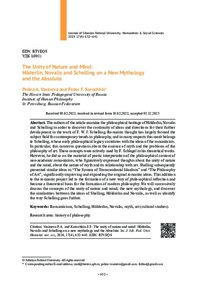The Unity of Nature and Mind: Höderlin, Novalis and Schelling on a New Mythology and the Absolute
Автор:
Vasineva, Polina A.
Korochkin, Fedor F.
Васинева, П.А.
Корочкин, Ф. Ф.
Дата:
2024-04Журнал:
Журнал Сибирского федерального университета. 2024 17(4). Journal of Siberian Federal University.Humanities & Social Sciences 2024 17(4)Аннотация:
The authors of the article examine the philosophical heritage of Hölderlin, Novalis
and Schelling in order to discover the continuity of ideas and directions for their further
development in the work of F. W. J. Schelling. Romantic thought has largely formed the
subject field for contemporary trends in philosophy, and in many respects this merit belongs
to Schelling, whose early philosophical legacy correlates with the ideas of the romanticists.
In particular, this concerns questions about the essence of myth and the problems of the
philosophy of art. These concepts were actively used by F. Schlegel in his theoretical works.
However, he did so on the material of poetic interpretation of the philosophical content of
non-academic romanticists, who figuratively expressed thoughts about the unity of nature
and the mind, about the nature of myth and its relationship with art. Shelling subsequently
presented similar ideas in “The System of Transcendental Idealism” and “The Philosophy
of Art”, significantly improving and expanding the original romantic ideas. This addition
to the romantic project led to the formation of a new way of philosophical reflection and
became a theoretical basis for the formation of modern philosophy. We will successively
discuss the concepts of the unity of nature and mind, the new mythology, and discover
the similarities between the ideas of Shelling, Hölderlin and Novalis, as well as identify
the way Schelling goes further Статья посвящена рассмотрению философского наследия Гельдерлина,
Новалиса и Шеллинга с целью обнаружения преемственности идей и направлений
их дальнейшего развития в творчестве Ф. В. Й. Шеллинга. Романтическая мысль
в значительной мере сформировала предметное поле для современных направлений
философии, и во многом эта заслуга принадлежит именно Шеллингу, раннее
философское наследие которого коррелирует с идеями романтиков. В частности,
это касается вопросов о сущности мифа и проблематики философии искусства.
Так, обозначенные концепты активно используются Ф. Шлегелем в теоретических
работах. Однако не менее значимым оказывается материал поэтической интерпретации
философского содержания у неакадемических романтиков, которые образно выразили
мысли о единстве разума и мира, о природе мифа и его связи с искусством. Впоследствии
Шеллинг изложил схожие идеи в «Системе трансцендентального идеализма»
и в «Философии искусства», значительно усовершенствовав и расширив первоначальные
романтические идеи. Это дополнение романтического проекта привело к становлению
нового способа философской рефлексии и стало теоретической базой для становления
современной философии. В статье последовательно рассматриваются концепты единства
разума и мира, новой мифологии, а также обнаруживаются сходства идей Шеллинга,
Гельдерлина и Новалиса, выявляется путь, которым Шеллинг идет дальше

